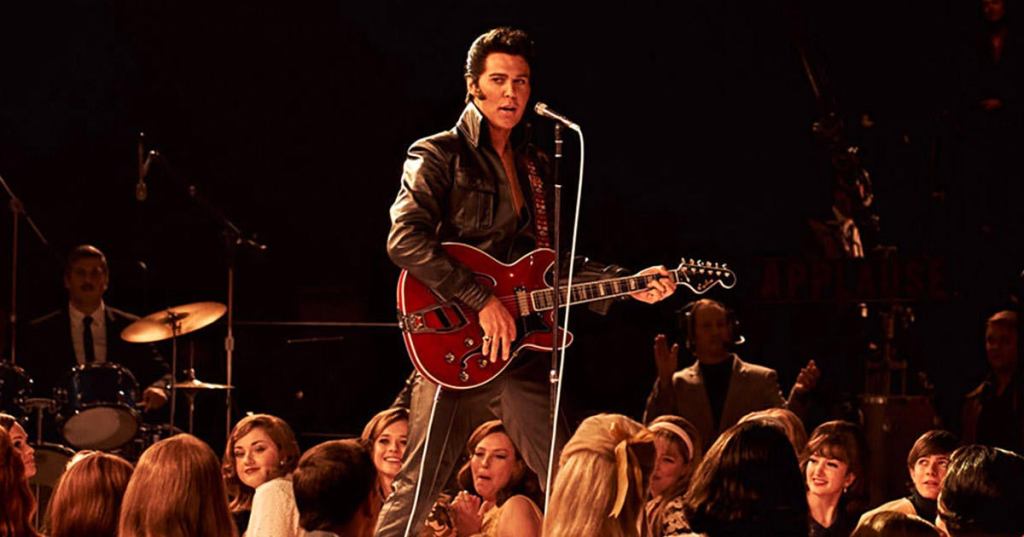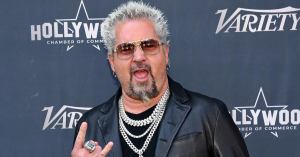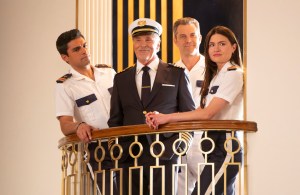Elvis Presley changed the music business when he shook his hips for an audience for the first time, and Baz Luhrmann tried to change the musical biopic by bringing the King of Rock and Roll back to life with Elvis. Luhrmann didn’t break the mold though, he just added as much of his personal flair to make Elvis his own while keeping the film firmly tied to the birth-to-death track. Elvis ends up being an exhausting experience, one that puts Presley’s role in crafting his persona into question and is lifted by an excellent lead performance from Austin Butler.
Elvis is told from the perspective of Colonel Tom Parker, played by Tom Hanks under all that makeup. It’s hard to really tell if Hanks is enjoying himself in a rare villainous role, and he seems to be wishing he was in a different Baz Luhrmann movie. Luhrmann’s decision to tell this story from Parker’s perspective is a bizarre move. The script, a collaboration between Luhrmann, Craig Pearce, Sam Bromell, and Jeremy Doner, is at odds with itself between making Presley into Parker’s Pygmalion-type creation and highlighting Presley’s genuine artistry. The movie doesn’t even start with Presley recording at Sun Records, but instead at Parker’s deathbed as he recounts meeting Presley. Like so many other biopics though, Elvis shows us things its narrator couldn’t possibly have been privy to as if Luhrmann is admitting that this framing device is a bad idea he regretted committing to.

Since Presley’s life is so well documented, Luhrmann has to make his style the star. The first half of Elvis is a dizzying, bombastic speed run through events that only the guy who made Moulin Rouge! could pull off. His soundtrack weaves Presley’s music and the Rhythm & Blues classics that influenced him with modern sounds that comment on events unfolding. Some of the choices work to highlight how Presley’s music continues to shape our culture, but it can also take us out of the movie as it does during scenes in 1950s Memphis. The other tricks Luhrmann can never avoid, from his beloved slow motion to fast jump cuts, also dominate the early parts of the movie.
Videos by PopCulture.com
Once Luhrmann calms down though, Elvis gives way to its other star, Butler. After his breakout role in Once Upon a Time in Hollywood, Butler’s performance as Presley is astonishing. Even as a hint of Britney Spears’ “Toxic” plays over Martin Luther King Jr.’s assassination, Butler conveys an emotional depth Luhrmann rarely gives time for in his films. The director’s music choice can’t keep that scene from being one of the best in the film, thanks to the actor’s performance. Elvis is at its best when Luhrmann reels himself in to allow Butler and his cast to just act.
Luhrmann’s casting choices also ensure that Elvis may hold the record for “most Australians acting with American accents in a single film.” The film was shot almost entirely in the director’s native country, which does have a big pool of talent for him to pull from. Olivia DeJonge is one of the few supporting players given time to shine as Priscilla Presley, making one wish the movie focused more on Elvis and Priscilla’s relationship instead of Elvis’ relationship with Parker. Richard Roxburgh gets a few good moments with Butler as Presley’s father. Many of the music artists, including Yola Quartey and Gary Clark Jr., who play Presley’s influences shine.
The second half of Elvis is where the movie goes off the rails. Luhrmann frames Presley’s famous ’68 Comeback Special as if everyone is preparing for the moon landing. Then Elvis becomes a prison-break movie, except the cell is a Las Vegas hotel and the prisoner is the King of Rock and Roll, backed by a horn section and full orchestra. It only proves how tragic the last years of Presley’s life were. The ’68 Comeback Special, along with late-career hits like “In The Ghetto” and “Suspicious Minds,” proved how he really could adapt to the changing cultural climate, but that pesky Parker came in to smash it all up. If only we could have seen this tragedy unfold through Presley’s eyes instead of Parker’s. Butler’s magnetic performance makes it easy to see why the Presley family has praised the film, but Elvis ultimately turns out to be more about a cranky old man blinded by his hubris than about the incredibly talented teen idol he was so desperate to control.








